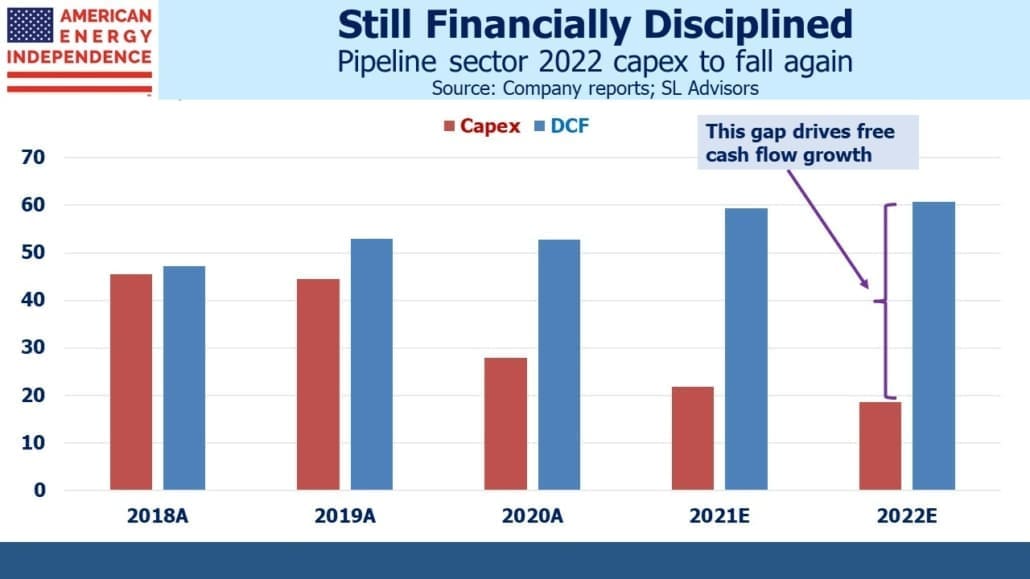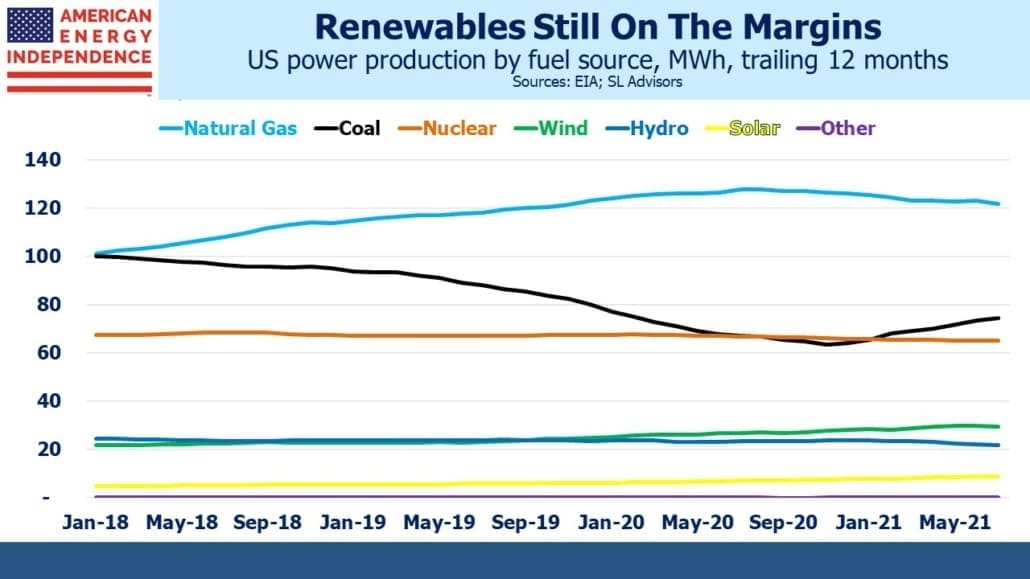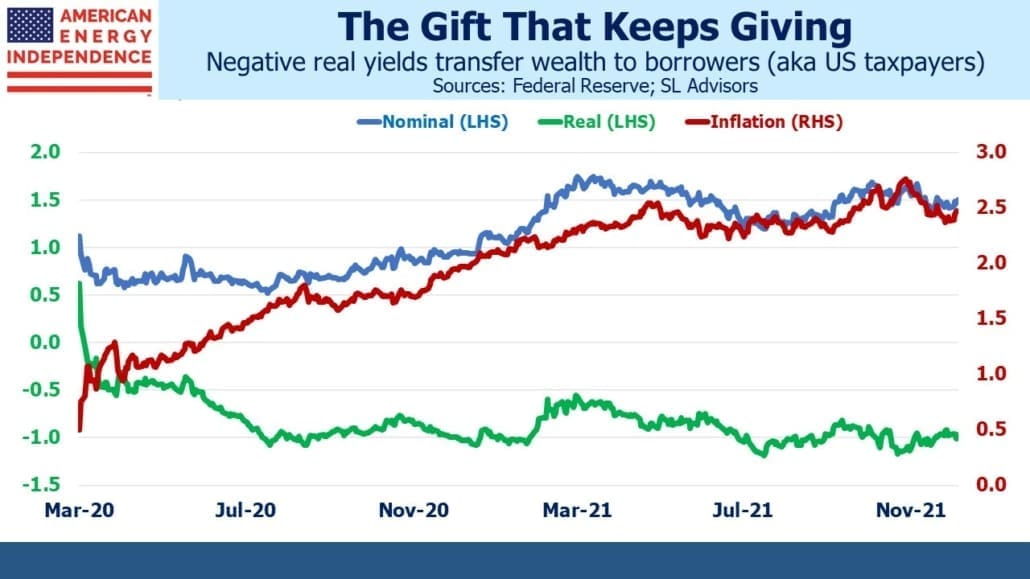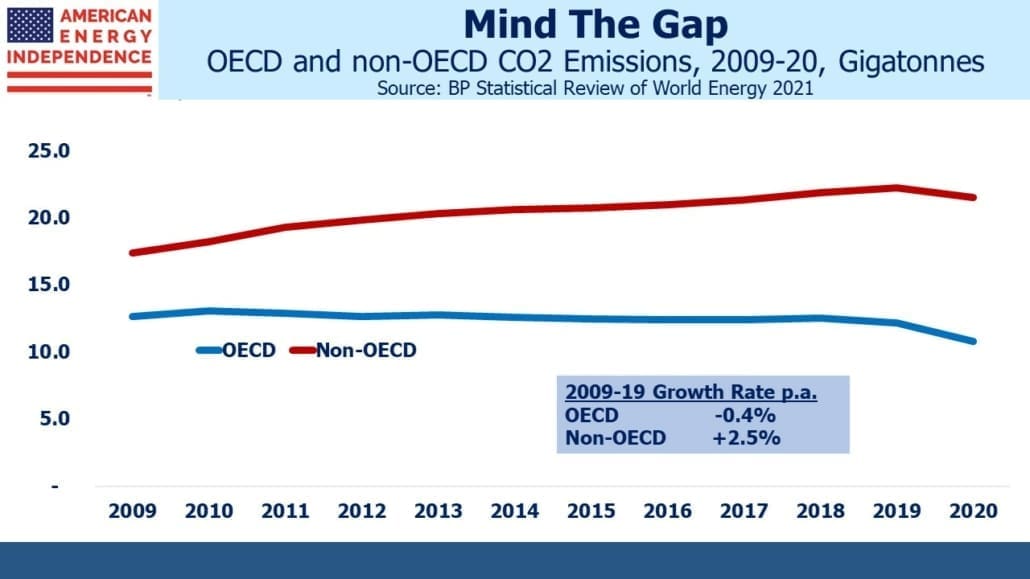The Upside Case For Pipelines – Part 1
The world doesn’t need another “what to expect in 2022” outlook piece. Inboxes are full of them this time of year. Therefore, what follows is part 1 of a two-part look at what could create upside surprises for midstream energy infrastructure. The downside is well understood and was experienced in full force quite recently. On March 18, 2020 the Alerian MLP Index (AMZIX) closed down 67% for the year. The broad-based American Energy Independence Index (AEITR) was marginally better at down 63%. There’s no plausible downside scenario that can beat that for a live ammunition drill. Within 19 months the two indices had rebounded 220% and 264% respectively.
What follows is inspired by Byron Wien’s Ten Surprises. These are upside developments that are plausible but not consensus. This blog post will focus on non-commodity price items – Sunday’s will look at scenarios for higher oil and gas.
1) Investors become convinced financial discipline will continue
Although growth capex peaked in 2018, the sector continues to be priced as if such prudence will prove temporary. We project that for the companies in our index 2021 spending will be down by more than half from the 2018 peak, and continue lower in 2022. A couple of companies are expected to buck this trend somewhat (Kinder Morgan and Pembina), but generally the direction is down. Lower spending has been the most important factor driving Free Cash Flow (FCF) higher, although rising Distributable Cash Flow (DCF) has also helped.
Although four years of discipline is presumably reflected in the market, we continue to believe that dividend yields above 7% and FCF yields above 11% reflect persistent skepticism, perhaps because of the prior history. This is an industry that long attracted income seeking investors with stable payouts that grew, and modest growth capex. The damage that abandonment of this model and the associated investor base caused still tarnishes its reputation. If the market starts to become convinced this is the new normal, the sector could reprice to the upside.
2) Pragmatism guides the energy transition
There’s little doubt that solar and wind will grow. But there aren’t many examples of intermittent power delivering the cheap energy and attractive jobs that progressives keep promising (listen to our podcast Incoherent Energy Policy). Failures are becoming more visible and costly – sky-high prices for Liquified Natural Gas (LNG) in Europe and Asia are the latest example of the recklessness of turning public policy against existing energy supplies while new ones remain inadequate.
Practical solutions may gain traction, including acknowledging a slower energy transition, increased use of nuclear, favoring natural gas over coal and boosting incentives for hydrogen, and for carbon capture and storage from the use of existing, reliable energy. Looking at the figures instead of the media’s breathless coverage, renewables are insignificant yet disruptive.
3) Real yields continue to fall
Ten year TIPs yields of –1.0% already seem impossibly low, but there is no theoretical limit to how far they can fall. This may temper an otherwise inevitable increase in bond yields, by projecting higher inflation expectations without a rise in nominal yields. The fall in real yields traces back decades and there’s no reason to think it stops here. It represents an enormous wealth transfer from those who must own sovereign debt — foreign central banks, pension funds and others with inflexible investment mandates. The beneficiaries are borrowers, chiefly the US government and by extension, taxpayers. It’s why our dire fiscal outlook continues – there is little discernible cost.
If these current trends continue the appeal of stable income with inflation protection, which real assets (including pipelines) offer, could become irresistible. Fixed income remains a completely losing proposition.
4) Inflation surprises to the upside
Most forecasters expect inflation to fall substantially in 2022. However, there are plenty of indications that Americans expect it to remain elevated. Low bond yields mean the yield curve could invert with as little as 1.5% of tightening by the Fed. This traditional precursor of a recession is likely to create offsetting concern about employment.
Having helped cause inflation, the Fed’s tools will as usual be blunt and they’ll face the unenviable choice between throwing people out of work or tolerating inflation closer to 3%. The return to 2% inflation over the long run is by no means assured. Real assets such as pipelines would benefit.
5) Republican mid-term gains squash any anti-energy sector legislation
Build Back Better remains alive and could pass in a further reduced form with climate change policies. Whether Joe Manchin and the White House reach agreement or not, this is probably the progressives’ last opportunity to implement the less extreme elements of their wish list.
A shift of the House back to Republican control, or the loss of one Democrat senator would leave executive actions as the only remaining tool. Perhaps this would even lead to a more substantive dialogue about the energy transition – one that acknowledges the cost and seeks to justify it, doesn’t falsely claim thousands of new jobs and explains why it’s in our interests to continue reducing emissions while most emerging economies are growing theirs. A thoughtful debate about how to manage the possible risks of increased emissions is overdue.
6) Sector fund flows turn positive
Sentiment is no longer negative and is showing signs of cautious optimism, at least based on the dozens of calls we’ve had in recent weeks. Fund flows turned negative in February 2020, and just turned positive two months ago. The sector has enjoyed a strong rally without significant retail participation. If the trend on inflows persists that could provide a significant boost.
Any one of these factors could push pipeline stocks higher. There remains plenty of opportunity for upside surprises.
We have three funds that seek to profit from this environment:
Please see important Legal Disclosures.
Important Disclosures
The information provided is for informational purposes only and investors should determine for themselves whether a particular service, security or product is suitable for their investment needs. The information contained herein is not complete, may not be current, is subject to change, and is subject to, and qualified in its entirety by, the more complete disclosures, risk factors and other terms that are contained in the disclosure, prospectus, and offering. Certain information herein has been obtained from third party sources and, although believed to be reliable, has not been independently verified and its accuracy or completeness cannot be guaranteed. No representation is made with respect to the accuracy, completeness or timeliness of this information. Nothing provided on this site constitutes tax advice. Individuals should seek the advice of their own tax advisor for specific information regarding tax consequences of investments. Investments in securities entail risk and are not suitable for all investors. This site is not a recommendation nor an offer to sell (or solicitation of an offer to buy) securities in the United States or in any other jurisdiction.
References to indexes and benchmarks are hypothetical illustrations of aggregate returns and do not reflect the performance of any actual investment. Investors cannot invest in an index and do not reflect the deduction of the advisor’s fees or other trading expenses. There can be no assurance that current investments will be profitable. Actual realized returns will depend on, among other factors, the value of assets and market conditions at the time of disposition, any related transaction costs, and the timing of the purchase. Indexes and benchmarks may not directly correlate or only partially relate to portfolios managed by SL Advisors as they have different underlying investments and may use different strategies or have different objectives than portfolios managed by SL Advisors (e.g. The Alerian index is a group MLP securities in the oil and gas industries. Portfolios may not include the same investments that are included in the Alerian Index. The S & P Index does not directly relate to investment strategies managed by SL Advisers.)
This site may contain forward-looking statements relating to the objectives, opportunities, and the future performance of the U.S. market generally. Forward-looking statements may be identified by the use of such words as; “believe,” “expect,” “anticipate,” “should,” “planned,” “estimated,” “potential” and other similar terms. Examples of forward-looking statements include, but are not limited to, estimates with respect to financial condition, results of operations, and success or lack of success of any particular investment strategy. All are subject to various factors, including, but not limited to general and local economic conditions, changing levels of competition within certain industries and markets, changes in interest rates, changes in legislation or regulation, and other economic, competitive, governmental, regulatory and technological factors affecting a portfolio’s operations that could cause actual results to differ materially from projected results. Such statements are forward-looking in nature and involves a number of known and unknown risks, uncertainties and other factors, and accordingly, actual results may differ materially from those reflected or contemplated in such forward-looking statements. Prospective investors are cautioned not to place undue reliance on any forward-looking statements or examples. None of SL Advisors LLC or any of its affiliates or principals nor any other individual or entity assumes any obligation to update any forward-looking statements as a result of new information, subsequent events or any other circumstances. All statements made herein speak only as of the date that they were made. r
Certain hyperlinks or referenced websites on the Site, if any, are for your convenience and forward you to third parties’ websites, which generally are recognized by their top level domain name. Any descriptions of, references to, or links to other products, publications or services does not constitute an endorsement, authorization, sponsorship by or affiliation with SL Advisors LLC with respect to any linked site or its sponsor, unless expressly stated by SL Advisors LLC. Any such information, products or sites have not necessarily been reviewed by SL Advisors LLC and are provided or maintained by third parties over whom SL Advisors LLC exercise no control. SL Advisors LLC expressly disclaim any responsibility for the content, the accuracy of the information, and/or quality of products or services provided by or advertised on these third-party sites.
All investment strategies have the potential for profit or loss. Different types of investments involve varying degrees of risk, and there can be no assurance that any specific investment will be suitable or profitable for a client’s investment portfolio.
Past performance of the American Energy Independence Index is not indicative of future returns.






This is an essay that needed to be written because, like many pipeline investors, I am losing hope that they will ever be more than high-yielding fixed income (i.e the total return story seems broken). It seems like they don’t really perform in any environment. Compounding the problem is that holding MLPs for many years leads to such a low cost basis that it is painful to sell. Trapped!
Suggestion: some bears suggest the sector has too much underutilized capital raising the specter of stranded assets and big write-offs coming. Could you address this in an essay?
curious as to what would cause downside in the fundamentals? (yes we know what drives sentiment/stocks lower, but what is risk to FCF?) thanks
It would be marvelous if optimism becomes realism.
The only aspect of your excellent analysis with which I disagree is the use of the word “Progressive” to describe the radical left. In denying the benefits of capitalism and in interfering in markets, they are Retrogressive. Of course, they ignore the past in denying or in ignoring what happened to communism and socialism wherever they have been practiced.
Another brilliant post. Note for webmaster: the line “A thoughtful debate about how manage the possible risks of increased emissions is overdue…” seems to be missing a preposition.
Happy New Year!
Thanks for the edit!